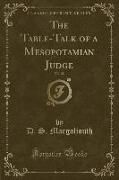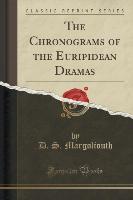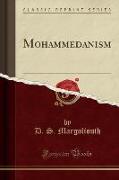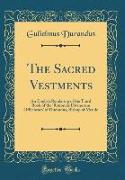The Table-Talk of a Mesopotamian Judge, Vol. 28 (Classic Reprint)
BücherAngebote / Angebote:
Excerpt from The Table-Talk of a Mesopotamian Judge, Vol. 28
The author of this work, al-Muhassin son of 'Alison of Mohammed son of Dawuld of the tribe Tanukh, figures occasionally in the Chronicles called The Eclipse of the Abbasid Caliphate, but not so frequently as his father, 'Ali, to whom there are several allusions in this book. There is a collection of anecdotes about him in Yaqut's Dictionary of Learned Men, where we are told that he was born in Basrah in 329 (began Oct. 6, 940 a.d.) and died in Baghdad in 384 (994 a.d.), after having occupied the position of judge (qadi) in many towns and districts of Mesopotamia.
The work of which the first Part is here presented in Arabic and English was according to the author commenced in the year 36r (971 a.d.), and according to one of Yaqut's authorities it occupied twenty years. Two other works by the same author are in existence, the collection of tales called al-Faraj ba'd al-Shiddah (Deliverance after Stress), of which we have a Cairene edition, and a collection of wise sayings, called 'Unwan al-Hikmah wal-Bayan (The Title of Wisdom and Eloquence), of which there is a MS. copy in the Bodleian Library.
The account of his work which the author gives in his Preface is clear and accurate, and such fragments as are to be found in various works of the ten Parts of it which have not yet come to light indicate that the style throughout was uniform. It was his purpose to record interesting facts which had come to his knowledge by personal experience or by hearsay, in general he avoided matter which had already appeared in books. He admits that there are exceptions to this rule to be found in his work, and indeed several of the stories already published in the Deliverance after Stress are repeated here.
The author belonged to a family which had originally come from Antioch, but in which the Judgeship had become hereditary in Mesopotamia. They followed the tenets of the Mu'tazils, or as they styled themselves "The People of Justice and Monotheism", who by admitting freedom of the will made it possible to believe in the justice of the Divine Being, and by denying the Divine Attributes arrived, as they supposed, at a truly Unitarian doctrine.
About the Publisher
Forgotten Books publishes hundreds of thousands of rare and classic books. Find more at www.forgottenbooks.com
This book is a reproduction of an important historical work. Forgotten Books uses state-of-the-art technology to digitally reconstruct the work, preserving the original format whilst repairing imperfections present in the aged copy. In rare cases, an imperfection in the original, such as a blemish or missing page, may be replicated in our edition. We do, however, repair the vast majority of imperfections successfully, any imperfections that remain are intentionally left to preserve the state of such historical works.
Folgt in ca. 5 Arbeitstagen




